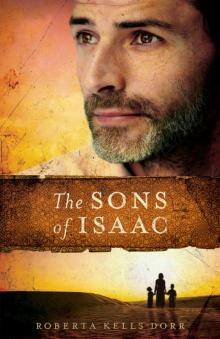- Home
- Roberta Kells Dorr
Honored Page 2
Honored Read online
Page 2
“And . . . ?”
“My father was gone a long time, and when he returned, we knew the news was bad, very bad. He sank down on a bench inside the door and, pushing back his headpiece, he leaned against the wall and shut his eyes as though he were exhausted. My mother rushed to him and begged him to tell us what had happened. He groaned, and my mother began to weep.
“‘Ann, don’t weep,’ he said. ‘The good Lord will help us. Mary has done nothing wrong.’
“I was so touched by my father’s confidence that I ran over and threw my arms around him and wept with him.” She pressed the end of her mantle to her trembling lips.
“It was not until bedtime that he felt he could tell us what had taken place at the house of my betrothed. ‘They were, of course, terribly disturbed,’ he said. ‘It was too much. They couldn’t understand.’
“Finally, Joseph’s father, Jacob, had said that his son was a man and could decide the issue himself.
“My father almost choked on the words as he told us what Joseph had said. ‘He was very kind,’ he said, ‘but puzzled.’ He assured my father that he would not bring me to public disgrace but, instead, would put me away quietly.”
“What did he mean, ‘put you away quietly’?” These customs were so foreign to me—I feared the worst.
“Usually, if a woman is found to be pregnant and is unmarried, she is brought to the public square and stoned to death. Joseph was saying that he would not demand such a punishment, but would prefer the whole thing be dealt with as quietly as possible. Of course, he was not going to marry me.”
“What did you think of all this? You must have been very upset.” I realized my voice had grown husky with emotion.
“There are no words to tell you how frightened I was. By now I was well aware of the seriousness of my condition.
“I went to the roof with my sleeping pad and tried to sleep, but I was too distraught. No one believed my story. They couldn’t imagine such a thing. All night long I was remembering everything the angel had said and weeping as I prayed for mercy. I knew the angel had said that with God all things are possible, but I had no faith that he could rescue me and this small child that would soon be born. I wept for myself and for my child.”
“And were you rescued?” I asked. I could hardly imagine a good outcome to her story.
She looked at me and smiled. Seeing how disturbed I was, she reached out and touched my hand. “I know now that God does hear us and answers when we cry out to him for help,” she said. “I didn’t know that then.”
“Are you telling me that help actually came?” I asked.
“It came in a way I could not have imagined. Just as the sun came up, there was a loud knocking at our front gate. I ran to the edge of the roof and looked down. There was Joseph and his father and grandfather. They were pounding on the gate. I saw my father go to the gate, and I observed his surprise when he opened the gate and found his three old friends standing there smiling. ‘We have good news,’ the old grandfather said as he stepped inside the gate.
“That was all I could hear from the roof, and it was only later that my father told me what had happened. When Joseph had gone to bed that night, he’d been greatly disturbed by the decision he’d made. He prayed and slept fitfully until suddenly, just as he dozed off, an angel appeared in a dream and told him that he must not be afraid to take me as his wife. The child I carried was of the Holy Spirit, and his name should be Jesus, meaning ‘savior.’ ”
With that amazing story, my first conversation with Mary, the mother of Jesus, came to an end. She invited me to stay and eat with some of Jesus’ friends, but I was too excited about all I had heard. I felt that I must get back to my room and write a letter to Theophilus telling him everything that had happened. John had also agreed to take me along with Mary to visit Bethlehem. “She has wanted to go back and visit the place where Jesus was born,” he said. “Every memory of him is very precious to her.”
Every day for a week, I went to see if it was time for the trip to Bethlehem. Several times I found Mary working at her loom. “I am weaving a prayer tallith,” she said. “It is a shawl every Jewish man must have for his prayer time. It covers his head and his shoulders, closing him in to concentrate on his prayers. I have always woven the clothes for my family, and I enjoy it very much. I once wove a very special seamless robe for my son, but it was taken by the soldiers while he was on the cross. They cast lots for it. John says this was predicted by the prophets.”
Another time she was making the challah loaves for the Sabbath. I watched her take down a wooden bowl, place in it some dough left over from the day before, and then add flour and water. She set it aside and watered her plants while she waited for the dough to rise. When it had risen, she began to move and push and fold and press until it was smooth and pliable.
“Why did you put the leftover dough in the bowl?” I asked.
She laughed. “It is fermented and makes the new bread rise. Of course, when we make the matzo bread for Passover, it must have no leaven in it at all. In fact, during the Feast of Unleavened Bread, we get rid of every bit of leavening in the house.”
I watched her again separate a part of the bread and asked her why she did this. She looked at me. “You aren’t used to any of our customs, are you?” she said.
“No,” I admitted, “but I would like to understand.”
“There are many sacred things about making bread,” she said. “It’s a special gift from God. He gives us the seeds for the wheat, and it is his sunshine and rain that make them grow. It is all a divine mystery. When I make the loaves, I am a part of this miracle. So I separate part of the dough to make a loaf to be taken to the priests in the temple as a thank offering.”
With that, she went back to preparing the dough in a carefully braided form and left it to rise. When it was finished, she gently placed the bread on woven trays and gave them to the serving girl to take to the ovens to be baked.
All this time I had been studying the scroll containing her genealogy. I had become interested in her genealogy when John told me that it was very much like Joseph’s. They had both descended from Israel’s great King David, and that is why their lives had been in jeopardy, forcing them to leave Jerusalem and move to Nazareth. Herod had believed that if he could destroy all the descendants of King David, he would feel secure on the throne.
“What is the difference between your list of ancestors and your husband’s?” I asked.
Her hands were still covered with flour as she came over and looked at the scroll I had unrolled. “You will notice,” she said, “that David had two sons that are especially featured in the genealogies. One is Solomon and the other is Nathan. My genealogy comes down through one of David’s sons and Joseph’s through the other.”
It was getting late and I had many things to attend to. And I could see she was too busy to talk. I excused myself and walked with Mary to the front gate. There was something I wanted to ask her—a favor—but I felt it was presumptuous. I hesitated, and when she noticed, she asked, “Is there some problem?” “No, not a problem,” I said.
“Then you wish to ask something?”
“That is true. I wish to ask a favor, something that would mean a great deal to me.”
“Don’t be afraid to ask. I can always say no.” She had such a gentle, understanding way about her that I suddenly felt free.
“We Greeks,” I said, “are not satisfied to live without being able to express ourselves in some artistic way. It is not enough to have a profession such as medicine; we must also be making music, writing poetry, or painting. I am a painter. Usually, if I am going on a trip, I take along my art supplies and paint whatever interests me. I didn’t intend to bring them with me this time, but I found, to my surprise, that my friend Theophilus had put them in secretly. He also wrote a note asking me to paint a picture of you. He put it this way: ‘If you find the stories to be true, I would be interested in a picture of this woman. Surely she is a most
unusual person. Without a picture, I may doubt she even exists.’ ”
She laughed. It was only the second time I had heard her laugh. “How strange,” she said, “that this is so important to your friend.”
She had no idea that people were interested in her. She had known she was important to her son, but she could not imagine being important to people who didn’t even know her.
“Would you mind,” I asked, “if I made a sketch some day, right here in your courtyard? I can do the actual painting in my room.”
She hesitated, then agreed, and the next day the sketch was made.
A few days later I had completed the painting. When I told her it was finished, she begged to see it. “I have never even heard of such a thing,” she said.
It was true. Since the making of graven images was forbidden by Jewish law, she could not imagine a painting, let alone a painting with herself as the subject.
The next day I brought the painting for her to see. It was done in dark colors on a piece of olive wood. It was a fair likeness, but I had painted her as being serious. I had not captured the pleasant, cheerful side of her nature.
She studied it a long time before she spoke. “I suppose,” she said, “since you made it, you could just as easily have made me young.”
“Of course I could have made you young, but I felt that for Theophilus it would be better to portray you as you are. Is there any reason you wanted me to paint you as young?”
“Oh yes,” she said. “I would have liked my child to be in the picture also. After all, he is the one who is important.”
“I don’t paint children very well,” I said hesitantly.
“But I can see you’re very talented. I’m sure you can do anything with your brushes, and you can easily fix this by just adding the baby.” She was pointing to the right side of the picture and smiling with such excitement that I couldn’t refuse her. It would be a very poor likeness, but I wanted to please her more than anything.
With just a few words of agreement, I picked up the picture, wrapped it in my cloak, and hurried out the door. I knew it would look strange for an older woman, as I had portrayed her, to be holding a baby, but since she saw nothing wrong with it, I decided to do my best.
It was almost another Sabbath before I finished the picture. I don’t paint children well, as I had told her, and this attempt was no exception. The child was not at all attractive. However, on the first day of the week, I carried it over for her to see.
“There,” she said, “now it’s perfect.” She didn’t seem to notice anything wrong. It was simply another miracle to her.
As we waited for John to make the final arrangements for us to visit Bethlehem, I talked to many people who had known Jesus. They told of miracles and parables, of his concern for sick people and his insistence on time alone for prayer. As I listened to them, I began to wonder what he thought his mission was. Why had he come at this time and to this place? I decided to ask his mother. Surely she had heard him express his thoughts on the subject.
I waited until the general work of the morning was finished, and then I asked her the question. “Who did Jesus say that he was? Did he ever say why he had come?”
She stopped and looked at me with that piercing awareness that gave the impression I had asked a question she found important. She sat down near the grape arbor and motioned for me to sit on the bench opposite her. She didn’t say anything right away but fingered a loose prong on her egg basket. She seemed intent on working it back into place and was not in a hurry to answer my question. By this time I had learned to wait patiently for answers. I found that she had pondered all these questions and had her own answers that must be stated just right.
She looked up and studied my face as if to see if I was ready for her answer. She must have been encouraged, because she set the egg basket on the ground beside her, clasped her hands on her lap, and began to explain.
“Most people were disappointed,” she said. “They thought the Messiah would solve all our physical and political problems. They had talked about it for years and were convinced they knew exactly what the Messiah’s coming would mean to all of us. But that wasn’t at all what he had in mind. ‘My kingdom is not of this world,’ he said, and we all puzzled over that. Then he said things like, ‘I came that you might have life and have it more abundantly.’ Most of us could only think of having a better life by having more riches, but that isn’t what he meant.”
“Did you ever find out what he did mean?” I asked.
“I suppose we’re still finding out,” she said, adjusting her mantle.
“But the kingdom he was talking about, what did he mean?”
“He did say at one time, ‘The kingdom of God is within you.’ ”
“How very strange. Did anyone understand what he was talking about?”
“In the end we could only watch what he did and determine what he meant by his actions.”
“Is there anyone who understood what he meant?”
“There are many who have caught a brief glimpse, and they are the ones who followed him, watching everything he did and listening carefully to what he said.”
“It must have been wonderful to have been healed by him. I would like to sit and talk to Lazarus. To be raised from the dead—what an extraordinary experience!”
“Lazarus has gone to Cyprus,” she said. “He felt it might be a place where he could go to spread the good news about Jesus. However, his sister is here, and she had an interesting experience with my son. It was at a time when she was rebellious and out of control. She had gone to Capernaum, and there she became involved in a very irreligious and even sinful way of life; but she was miserable. Perhaps she will tell you the rest of her story.”
“How can I find her? Her story may help me understand who Jesus was.”
“If you wait here, you will see her. This is the day she usually comes down from Bethany to bring me eggs.”
As it turned out, I had only a short time to wait. There was a soft knock on the outer door, and within minutes the two women, Mary the mother of Jesus and Mary from Bethany, were greeting each other. I had only this brief time to study the visitor. She was slight and delicate, wearing layers of filmy garments that swirled and eddied gracefully around her. The mantle had fallen from her head down around her shoulders, revealing a veritable cascade of curly brown hair. She brushed it back from her eyes with one hand and set the basket she carried down on a ledge. I could see the basket was full of white eggs.
Mary said something, and I noticed that the visitor looked around the courtyard until she spotted me. She smiled, and Mary brought her over to where I was sitting under the grape arbor. “This is Mary, the sister of Lazarus I told you about. She says Lazarus has gone to Cyprus, but she will be glad to answer any questions you may have. She doesn’t have much time today, but she comes often, so you may see her again before you leave.”
With that, Mary motioned to a stone stool, and the visitor sat down and adjusted her skirts before looking up and smiling at me. “What do you want to know?” she asked.
“I did want to know about your brother Lazarus, but now that my hostess has told me of an interesting encounter you had with the Rabbi, Jesus, I would like to hear your story.”
She blushed and looked down, nervously fingering the folds in her dress. “It is a difficult story for me to tell,” she said in a low voice. “I am so ashamed. You must understand—I had been very foolish. I was a great embarrassment to my family.” Here she paused, and I noticed a tear rolling down her cheek. She brushed it away with her hand and glanced at me to see if I still wanted to hear her story.
“You don’t have to give any details. I am mainly interested in how you met Jesus and what he said to you.”
Her expression changed, and she looked relieved. She paused for a moment as if remembering the incident and then began speaking slowly, sometimes closing her eyes as though actually seeing Jesus sitting at the table in the house of the Pharisee. “Th
at Pharisee was so rude,” she said bursting out with such feeling that I was surprised. “He had asked Jesus to dinner and then didn’t even carry out the basic niceties. He had many servants, but he never asked a one of them to wash the Rabbi’s feet.
“I’m an impulsive person. When I saw that kind, loving man being so mistreated, I couldn’t stand it. I had just been to the apothecary and had bought an expensive alabaster cruse of rare perfume. I rushed into the house, past the doorman, and over to the table. Before anyone could stop me, I had uncorked the jar and poured some of the ointment on Jesus’ feet. I didn’t have a towel, so I used the only thing I had—my hair. As I remember it, I wept and dried his feet while the Pharisee said terrible things about me. He told Jesus I was an evil woman and scoffed at him for letting me wash his feet.
“Jesus rebuked the Pharisee, reminding him that no one had washed his feet when he entered and that I had both washed his feet with the ointment and tears and wiped them with my hair. Then Jesus did an astonishing thing—he turned to the men who were ready to throw me out and said, ‘Her sins, which are many, are forgiven for she loved much.’ He told me my sins were forgiven and that my faith had saved me. Then very gently he said, ‘Go in peace.’ He didn’t embarrass me by telling what my sins were, nor did he condemn me as the scribes and the Pharisees would have done.
“From that moment on I have loved him as I have never loved anyone else,” she said. “He gave me hope and changed my life.” With that, she burst into tears, and I decided that this was not the time to ask her about her brother, Lazarus.
The trip to Bethlehem soon became a reality. Donkeys were borrowed, provisions were organized, and the relatives in Bethlehem were notified. There was to be no sleeping in the stables on this trip. Mary, of course, wanted to visit the stable where she and Joseph had found shelter the night when Jesus was born, but she didn’t want to linger in its cold, damp darkness. The rains were about to descend on Bethlehem along with the cold. It would be necessary for those who were going to have warm clothes and a comfortable, dry place to sleep.

 Honored
Honored The Sons of Isaac
The Sons of Isaac Abraham and Sarah
Abraham and Sarah Queen of Sheba
Queen of Sheba